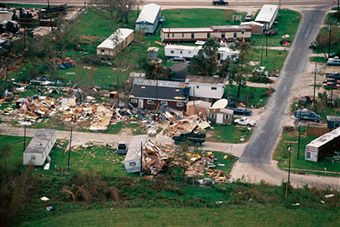اینترنت

The Internet
The first working computers in the 1950s and 1960s were large mainframe machines. In some ways, they were like large calculating machines. The U.S. government, the military and businesses and institutions used them for specific tasks. For example, they might be used to handle the payroll.
As more uses were found for computers, the need to transfer data from one computer to another became a concern. In 1969, the U.S. government sponsored a program to explore ways for computers to transfer data over telephone lines. The first Internet was created with four computers linked together.
Of course, computer use increased beyond anyone’s expectations. Standards were developed that describe how data was to be transferred between computers. A common language for commands and communications emerged. Operating programs such as MS-DOS, UNIX, Macintosh and Windows came into existence.
The Internet quickly expanded beyond government and military uses. The PC became the standard form of computer. Private agencies acted as hosts for Internet usage. Around 1982, there were 213 hosts; by 1986, there were 2,300; today, there are millions.
The role of computers expanded so quickly that the U.S.S.R., which had discouraged computer use, found itself left behind by the U.S.A. Part of the reason for the collapse of the Soviet Union in 1989 was that they had fallen too far behind the United States in high tech areas to ever catch up.
One of the most popular uses of the computer is electronic mail, or e-mail. You can send a letter by computer over the Internet to anywhere in the world in seconds or less. And it doesn’t cost anything extra. Now data can be transferred great distances almost instantaneously.
Another major Internet use is the World Wide Web. In the early days, all web pages were text only. In the 1990s, it became possible to make web pages interactive and multi-media. Interactive means that readers could click on items on the web page and get more information. They could also communicate directly with the web-page owner. Multi-media means that web pages were no longer text only. They could also have graphics, film/video, and audio. This has helped to turn computers into popular entertainment.
Nowadays, people spend hours every day surfing the net. However, there are some problems. For some people, computers are addictive. Many businesses are trying to control employees using the net during working hours. Since the Internet includes just about every kind of information, not all of it is good. You can find directions on how to be a criminal or a terrorist. There are scam artists who want to cheat you out of your money. There are also aggressive, pornography salesmen, not to mention people who want to kill your computer with viruses.
Since the Internet is not closely regulated, it is up to individual users to follow computer etiquette. Parents need to supervise their children’s use of the net. Although the Internet has some disadvantages, many people see the net as one of the greatest inventions of modern times.
Mainframe

Source 1
A large powerful computer, usually the centre of a network and shared by many us
Source 2
A large powerful computer that can work very fast and that a lot of people can use at the same time: If a problem does occur, a signal is automatically sent to the mainframe
Handle

Source 1
To deal with a situation, a person, an area of work or a strong emotion
Handle something/somebodyA new man was appointed to handle the crisis.
She’s very good at handling her patients.
The sale was handled by Adams Commercial.
We can handle up to 500 calls an hour at our new offices.
We all have to learn to handle stress.
This matter has been handled very badly.
(informal) ‘Any problems?’ ‘Nothing I can’t handle.’
(informal) I’ve got to go. I can’t handle it any more (= deal with a difficult situation).
Source 2
To deal with a situation or problem by behaving in a particular way and making particular decisions: The headmaster handled the situation very well.
I knew I had handled the matter badly.
Leave it to me. I can handle it.
Most customers were satisfied with the way their complaints were handled.
Opposition leaders will be watching carefully to see how the Prime Minister handles the crisis.
Payroll

Source 1
The total amount paid in wages by a company
The firm is growing fast with a monthly payroll of $1 million.
Source 2
The total amount of wages paid to all the people working in a particular company or industry: the annual payroll was $88 million
Emerge

Source 1
To start to exist; to appear or become known
After the elections opposition groups began to emerge.
The emerging markets of South Asia
Emerge as something He emerged as a key figure in the campaign
Source 2
To begin to be known or noticed: a religious sect that emerged in the 1830s
Emerge as Local government has recently emerged as a major issue.
Discourage

Source 1
To try to prevent something or to prevent somebody from doing something, especially by making it difficult to do or by showing that you do not approve of it
Discourage (doing) somethingA campaign to discourage smoking among teenagers
Discourage somebodyI leave a light on when I’m out to discourage burglars.
Discourage somebody from doing something His parents tried to discourage him from being an actor.
Source 2
To persuade someone not to do something, especially by making it seem difficult or bad [≠ encourage]: attempts to discourage illegal immigration
Discourage somebody from doing something My father is a lawyer, and he discouraged me from entering the field.
! Do not say ‘discourage someone to do something’. Say discourage someone from doing something.
Collapse

Source 1
To fail suddenly or completely
Synonym: break down
Talks between management and unions have collapsed.
All opposition to the plan has collapsed.
Source 2
If a system, idea, or organization collapses, it suddenly fails or becomes too weak to continue: The luxury car market has collapsed.
I thought that without me the whole project would collapse.
Instantaneously

Source 1
Instantaneous adjective
Happening immediately
An instantaneous response
Death was almost instantaneous.
Instantaneously adverb
Source2
Instantaneous
Happening immediately: modern methods of instantaneous communication
Instantaneously adverb
Surf

Source 1
Surf the Net/Internet to use the Internet
I was surfing the Net looking for information on Indian music.
Source 2
Surf the Net/InternetTo look quickly through information on the Internet for anything that interests you
Out of

Used to show the reason why something is done
I asked out of curiosity.
She did it out of spite.
Scam

Source 1
A clever and dishonest plan for making money
An insurance scam
Usage note: Crime
Committing a crimecommit a crime/a murder/a violent assault/a brutal killing/an armed robbery/fraud
be involved in terrorism/a suspected arson attack/people smuggling/human trafficking
engage/participate in criminal activity/illegal practices/acts of mindless vandalism
steal somebody’s wallet/purse/(British English) mobile phone/(North American English) cell phone
rob a bank/a person/a tourist
break into/(British English) burgle/(North American English) burglarize a house/a home/an apartment
hijack a plane/ship/bus
smuggle drugs/weapons/arms/immigrants
launder drug money (through something)
forge documents/certificates/passports
take/accept/pay somebody/offer (somebody) a bribe
runa phishing/an email/an Internet scam
Fighting crimecombat/fight crime/terrorism/corruption/drug trafficking
prevent/stop credit-card fraud/child abuse/software piracy
deter/stop criminals/burglars/thieves/shoplifters/vandals
reduce/tackle/crack down on knife/gun/violent/street crime; (especially British English) antisocial behaviour
foil a bank raid/a terrorist plot
help/support/protect the victims of crime
Investigating crimereport a crime/a theft/a rape/an attack/(especially British English) an incident to the police
witness the crime/attack/murder/incident
investigate a murder/(especially North American English) a homicide/a burglary/a robbery/the alleged incident
conduct/launch/pursue an investigation (into…); (especially British English) a police/murder inquiry
investigate/reopen a criminal/murder case
examine/investigate/find fingerprints at the crime scene/the scene of crime
collect/gather forensic evidence
uncover new evidence/a fraud/a scam/a plot/a conspiracy/political corruption/a cache of weapons
describe/identify a suspect/the culprit/the perpetrator/the assailant/the attacker
question/interrogate a suspect/witness
Solve/crack the case
More collocations at justice
Source 2
A clever but dishonest way to get money:
He got involved in a credit card scam.
Aggressive

Source 1
Angry, and behaving in a threatening way; ready to attack
He gets aggressive when he’s drunk.
A dangerous aggressive dog
Source 2
Behaving in an angry, threatening way, as if you want to fight or attack someone:
Jim’s voice became aggressive.
Teachers apparently expect a certain amount of aggressive behaviour from boys.
Pornography (disapproving) books,videos,etc. that described or show naked people and sexual acts in order to make people feel sexually excited, especially in a way that many other people find offensive.
Regulate

Source 1
To control something by means of rules
The activities of credit companies are regulated by law.
The government accepts whaling in principle as long as it is carefully regulated.
It is up to the regulating authority to put the measures into effect.
Source 2
To control an activity or process, especially by rules:
Strict rules regulating the use of chemicals in food